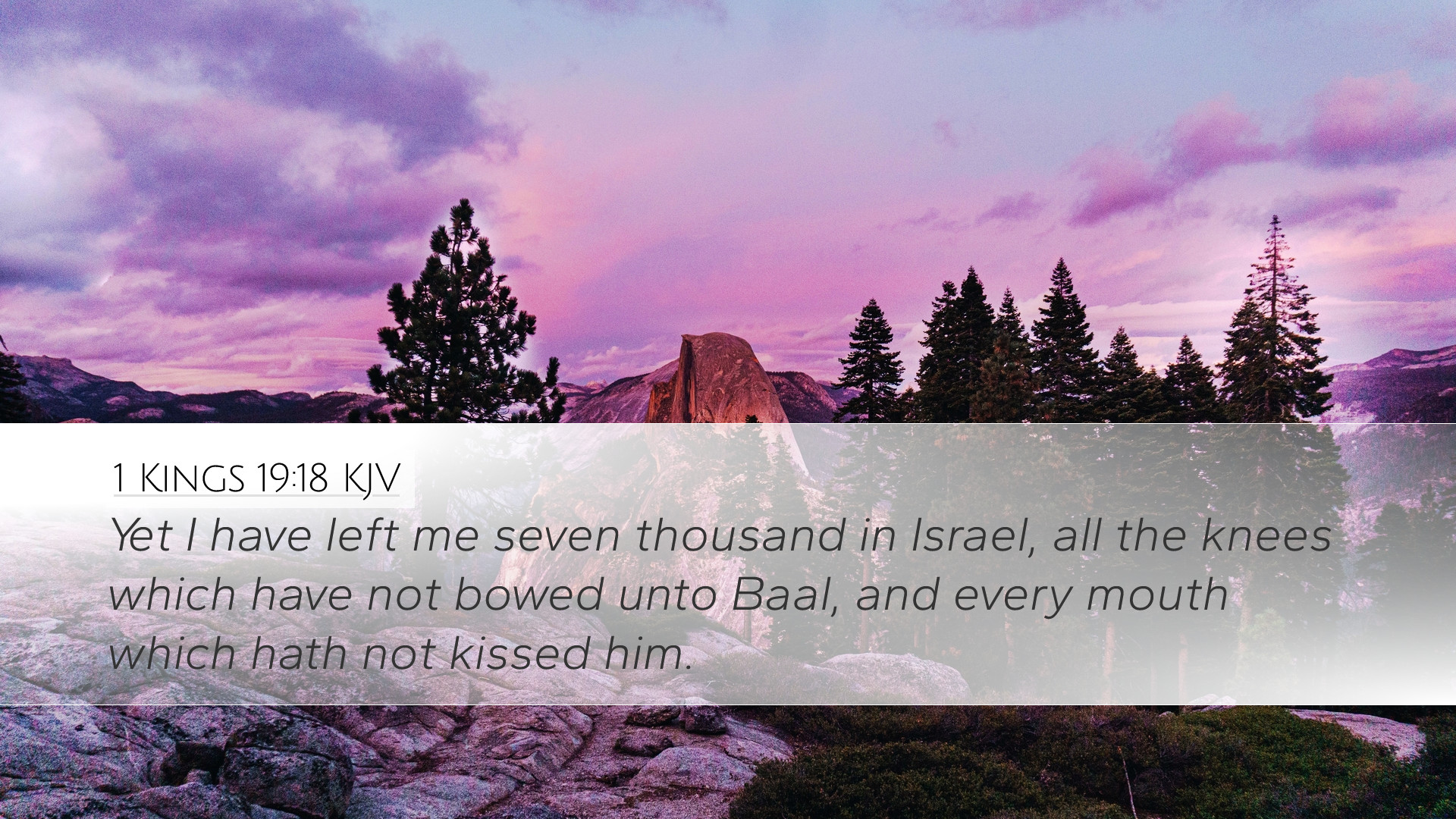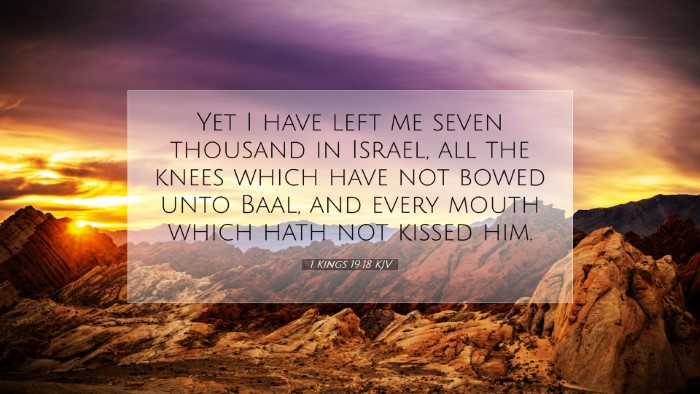Old Testament
Genesis Exodus Leviticus Numbers Deuteronomy Joshua Judges Ruth 1 Samuel 2 Samuel 1 Kings 2 Kings 1 Chronicles 2 Chronicles Ezra Nehemiah Esther Job Psalms Proverbs Ecclesiastes Song of Solomon Isaiah Jeremiah Lamentations Ezekiel Daniel Hosea Joel Amos Obadiah Jonah Micah Nahum Habakkuk Zephaniah Haggai Zechariah Malachi1 Kings 19:18
1 Kings 19:18 KJV
Yet I have left me seven thousand in Israel, all the knees which have not bowed unto Baal, and every mouth which hath not kissed him.
1 Kings 19:18 Bible Commentary
Commentary on 1 Kings 19:18
Verse Text: "Yet I have reserved seven thousand in Israel, all the knees that have not bowed unto Baal, and every mouth which hath not kissed him."
Introduction
The narrative in 1 Kings 19 unfolds in a critical theological juncture in Israel's history. After Elijah's confrontation with the prophets of Baal, he faced a moment of despair following Queen Jezebel's threats on his life. This declaration of God's remnant in 1 Kings 19:18 serves to reaffirm divine sovereignty and the continuity of God’s covenant relationship with His people.
God's Assurance and Divine Preservation
Matthew Henry emphasizes that God’s mention of the seven thousand underscores His faithfulness in preserving a faithful remnant. In the face of overwhelming idolatry, God assures Elijah that he is not alone in his commitment to Yahweh. The concept of a remnant is crucial in understanding God's governance. It demonstrates that God remains in control, even in times of extensive moral failure amongst His people.
Albert Barnes points out that these seven thousand represent the true Israelites who have retained their devotion. This remnant becomes a pivotal point for understanding God's ongoing plan for Israel and His desire for a pure worshipping community.
The Significance of Knees and Mouths
This verse highlights two actions: the bending of knees and the kissing of Baal. Adam Clarke notes that the expression used indicates not merely a passive acknowledgment of Baal but an active worship. The act of bowing signifies submission and reverence, while kissing suggests an intimate devotion. Thus, God's proclamation denotes a clear demarcation between loyalty to Him versus allegiance to false idols.
Moreover, these symbols denote how integral worship practices were in ancient Israel's cultural and spiritual life. They reflect a tangible expression of faith, establishing the notion that worship involves both inward commitment and outward expression.
Theological Implications of God's Remnant
This proclamation carries significant theological weight, as explained by Henry, who reflects on how God’s remnant is not merely a statistical figure but embodies God's grace and righteousness in a deteriorating society. The remnant's preservation serves as a beacon of hope, showcasing God's commitment to His covenant promises.
Barnes adds that this remnant exemplifies the notion of election and divine selection. It establishes an understanding that God retains sovereignty in choosing those who will remain faithful, therefore complicit in the divine narrative. Theologically, this enlightens scholars on the interplay between divine grace and human responsibility in the trajectory of faith.
The Context of Elijah's Journey
Elijah's despair prior to this revelation illustrates a common spiritual crisis faced by leaders and prophets. Clarke discusses how Elijah’s experience of feeling isolated reflects essential human emotions in ministry. Even the most dedicated servants of God may encounter seasons of discouragement and perceived loneliness. This personal reflection emphasizes the importance of divine encouragement through God's omniscient awareness of His followers.
Application for Modern Believers
Understanding the significance of God's remnant extends to modern believers, showcasing that even in a culture that seems predominantly secular, God retains His faithful followers. Henry notes that though the broader society may bow to modern idols, God’s faithful will stand firm. Pastors and theologians can draw on this for preaching about perseverance in faith amid adversity.
This notion equips believers with the assurance that their struggles are not unique and that they are part of a much broader narrative of grace and preservation through history. The significance of worship, defined through actions, reinforces the call to integrity in faith—an essential message for today’s church.
Conclusion
In conclusion, 1 Kings 19:18 stands as a testimony to God's unyielding faithfulness to His covenant people, offering profound insights into the nature of worship, faithfulness, and the divine assurance of His presence even in tumultuous times. Reflecting on this passage provides both encouragement for those in ministry and a deeper understanding of God’s character as a preserver of His truth.
This verse and its accompanying commentary compel pastors, students, theologians, and Bible scholars to explore deeper theological truths about God's sovereignty and grace, urging them to remain steadfast in their faith and resilient in their worship.


